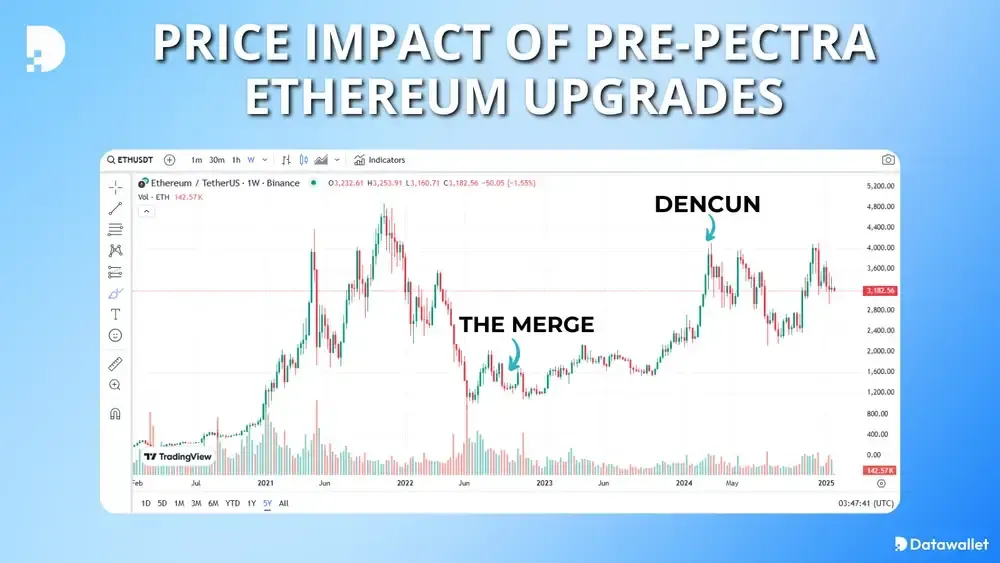Ethereum Pectra Upgrade & EIPs Explained

Summary: Ethereum’s Pectra upgrade, set for March 2025, improves staking and wallet functionality with EIP-7702 (account abstraction) and EIP-7251 (higher validator limits).
While delays and internal disputes have tempered expectations, Pectra strengthens Ethereum’s foundation ahead of the Fusaka upgrade, which is expected later in the year.
What is the Ethereum Pectra Uprade?
The Ethereum Pectra upgrade, expected in March 2025, brings major improvements to Ethereum’s execution and consensus layers, Prague and Electra. It implements eight Ethereum Improvement Proposals (EIPs) while postponing twelve others for future updates.
Pectra’s development has been turbulent, marked by delays and internal disputes, often called "roadmap wars." After running on seven devnets, it was deployed on the Mekong testnet on November 7, 2024, as the final step before launch.
Most Important Pectra EIPs
- EIP-7702: A step toward account abstraction, making wallets more flexible. Vitalik Buterin drafted this in just 22 minutes to address backlash against EIP-3074.
- EIP-7251: Raises the staking limit for validators from 32 ETH to 2,048 ETH, allowing for more efficient staking.
Initially positioned as Ethereum’s biggest upgrade, Pectra has lost momentum due to delays and a phased release. While some question its impact, its improvements to staking and usability lay the groundwork for Ethereum’s next major update, Fusaka.

Confirmed EIPs for Pectra Upgrade
The first phase of Pectra will prioritize 8 EIPs that directly strengthen Ethereum’s core functionality, resolving critical inefficiencies in validator operations, transaction processing, and data availability while maintaining the network's reliability during its scaling journey.
Key EIPs and Their Impact
- EIP-2537: Introduces precompiles for BLS12-381 curve operations, optimizing cryptographic processes and enabling better scalability for ZK rollups and privacy-preserving applications.
- EIP-2935: Allows historical block hashes to be served from the state, laying the groundwork for Verkle trees and improving state management efficiency.
- EIP-6110: Moves validator deposits directly onto the execution layer, reducing deposit-to-activation delays from 12 hours to approximately 13 minutes, greatly improving staking.
- EIP-7002: Supports execution layer-triggerable validator withdrawals, letting stakers initiate withdrawals without relying on validator operators, supporting DeFi staking pools.
- EIP-7251 (Maxeb): Increases the validator staking limit from 32 ETH to 2048 ETH, consolidating validators for greater network efficiency and reducing the total number of active validators.
- EIP-7685: Improves execution-consensus layer communication, allowing smart contracts on the execution layer to interact directly with consensus processes.
- EIP-7702: Enables a light version of account abstraction, introducing transaction bundling, gas fee sponsorship by third parties, and the ability for EOAs to behave like smart contracts.
- EIP-7742: Introduces dynamic adjustments for blob capacity in response to network demand, increasing Ethereum's data availability and scalability for rollups.

Delayed EIPs for Future Upgrades (Post-Pectra)
Twelve EIPs originally proposed for Pectra have been deferred due to their intricacy, dependencies on foundational changes, or the potential risks they pose to Ethereum’s stability. These EIPs are now expected to be included in the Fusaka upgrade, the next major step following Pectra.
Key Deferred EIPs
- EOF (Ethereum Object Format): Improves the Ethereum Virtual Machine with a modular structure for smart contracts, reducing deployment costs, and better optimization of contract execution.
- EIP-7594: Focuses on creating a distributed system (PeerDAS) for Layer 2 data availability, but it was deemed too complex to include in Pectra.
- Verkle Trees: Adds a more compact and efficient data structure to replace Merkle trees, enabling stateless Ethereum clients, reducing the storage burden for validators.
- EIP-7623: Proposes higher calldata costs for rollups to incentivize the use of blobs for off-chain data storage, which improves scalability but may temporarily increase fees for L2s.
- EIP-7782: Reduces Ethereum's slot time to optimize block finalization speed and transaction throughput, but demands careful testing to avoid compromising network stability.
- EIP-7783: Gradual increases to gas limits, allowing the network to handle higher transaction volumes over time, but requires further evaluation on centralization and hardware constraints.

Ethereum Pectra Release Date
The Pectra upgrade is officially set for mid-March 2025, with testing on Sepolia and Holesky testnets expected to finalize in February. While initial timelines suggested a possible April 2025 launch, recent updates confirm that Pectra is on track for early Q1 deployment.

Does Pectra Benefit ETH Holders?
With Pectra’s focus on scalability, staking efficiency, and usability, ETH holders could benefit from greater adoption and network usage. If Pectra follows the trend of past upgrades, it could act as a catalyst for ETH’s price growth in the lead-up to its release.
Historically, Ethereum upgrades have positively impacted ETH’s price. For example, the Chaella upgrade in April 2023 led to a 45% price increase, and the Dencun (Cancun-Deneb) upgrade in March 2024 drove a 70% rally before its deployment, demonstrating the bullish potential of major upgrades.
As for onchain users, Pectra improves Ethereum’s user experience tremendously. EIP-7702 allows wallets to batch transactions, sponsor gas fees, and set spending limits, making Ethereum more user-friendly and attractive to new users and institutions.

Proposal Risks
Despite strong anticipation for Pectra, ongoing delays, governance disputes, and uncertainty over a potential Ethereum Foundation split have weighed on market sentiment, raising concerns about the upgrade's long-term impact on ETH.
Main Risks for the Prague/Electra Upgrade
- Validator Consolidation Risks: Consolidating ETH stakes may reduce the number of validators, increasing centralization and single points of failure.
- Blob Capacity Increase Risks: Higher blob throughput could negatively impact decentralization and discourage solo staker participation.
- Data Availability (DA) Risks: Changes to data availability may increase transaction fees and impact Layer 2 profitability in the short term.
- Complexity and Scope Risks: Merging numerous EIPs and splitting Pectra into phases could lead to incomplete deployments and developer disagreements.
- Economic Impact Risks: Wallet upgrades enabling gas payments with alternative tokens may lower ETH demand as the primary fee currency.
- Security Risks: New cryptographic mechanisms and validator features could introduce unforeseen vulnerabilities and operational risks.
Final Thoughts
The Pectra upgrade, despite its technical ambitions, has failed to spark pre-event excitement, reflecting Ethereum’s long history of upgrade-driven hype cycles and disappointing price action.
Institutional backing through US Ethereum ETFs has done little to counter waning community sentiment, as even developers appear fragmented and disillusioned with Ethereum’s trajectory.
Yet, Ethereum maxis hold onto hope, viewing Pectra as the long-overdue inflection point to reclaim its narrative. Can Ethereum finally find its North Star, remains to be seen after Q1, 2025.
.webp)
Written by
Jed Barker
Editor-in-Chief
Jed, a digital asset analyst since 2015, founded Datawallet to simplify crypto and decentralized finance. His background includes research roles in leading publications and a venture firm, reflecting his commitment to making complex financial concepts accessible.

.webp)
%2520(1).webp)

.webp)



